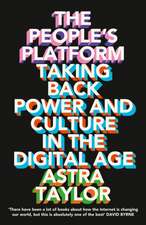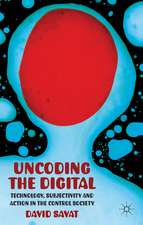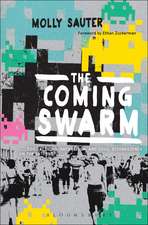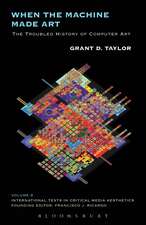The Digital Humanities and the Digital Modern
Autor James Smithiesen Limba Engleză Hardback – 6 sep 2017
Preț: 783.50 lei
Preț vechi: 955.49 lei
-18% Nou
Puncte Express: 1175
Preț estimativ în valută:
149.92€ • 163.36$ • 126.33£
149.92€ • 163.36$ • 126.33£
Carte tipărită la comandă
Livrare economică 23 aprilie-07 mai
Preluare comenzi: 021 569.72.76
Specificații
ISBN-13: 9781137499431
ISBN-10: 1137499435
Pagini: 208
Ilustrații: IX, 268 p. 5 illus.
Dimensiuni: 148 x 210 mm
Greutate: 0.49 kg
Ediția:1st ed. 2017
Editura: Palgrave Macmillan UK
Colecția Palgrave Macmillan
Locul publicării:London, United Kingdom
ISBN-10: 1137499435
Pagini: 208
Ilustrații: IX, 268 p. 5 illus.
Dimensiuni: 148 x 210 mm
Greutate: 0.49 kg
Ediția:1st ed. 2017
Editura: Palgrave Macmillan UK
Colecția Palgrave Macmillan
Locul publicării:London, United Kingdom
Cuprins
1. Introduction.- 2. The Digital Modern.- 3. Computation and Crisis.- 4. AI, DH, and the Automation of Labour.- 5. Towards a Systems Analysis of the Humanities.- 6. Software Intensive Humanities.- 7. The Ethics of Production.- 8. Conclusion: The Culture of the Digital Humanities.-
Notă biografică
James Smithies is Director of King’s Digital Lab at King’s College London. He was previously Senior Lecturer in Digital Humanities and Associate Director of the UC CEISMIC Digital Archive at the University of Canterbury, New Zealand.
Textul de pe ultima copertă
This book provides new critical and methodological approaches to digital humanities, intended to guide technical development as well as critical analysis. Informed by the history of technology and culture and new perspectives on modernity, Smithies grounds his claims in the engineered nature of computing devices and their complex entanglement with our communities, our scholarly traditions, and our sense of self. The distorting mentalité of the digital modern informs our attitudes to computers and computationally intensive research, leading scholars to reject articulations of meaning that admit the interdependence of humans and the complex socio-technological systems we are embedded in. By framing digital humanities with the digital modern, researchers can rebuild our relationship to technical development, and seek perspectives that unite practical and critical activity. This requires close attention to the cyber-infrastructures that inform our research, the software-intensive methods that are producing new knowledge, and the ethical issues implicit in the production of digital humanities tools and methods. The book will be of interest to anyone interested in the intersection of technology with humanities research, and the future of digital humanities.
Caracteristici
Connects digital humanities with the history, philosophy of technology, and engineering Pioneers the concept of the 'digital modern' Provides a critical and methodological perspective on digital humanities, grounded in the history and philosophy of computing Includes supplementary material: sn.pub/extras
















